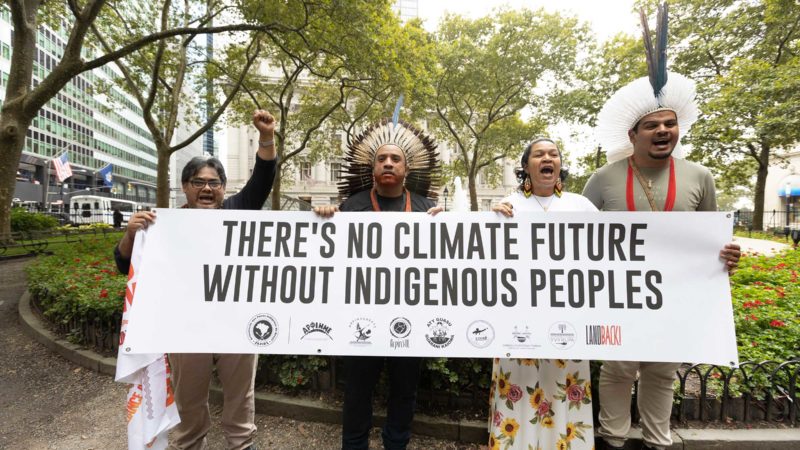The GATC gathered in New York City for Climate Week. IMAGE CREDIT: Rachel Elkind
- Members of the Global Alliance of Territorial Communities (GATC) met in Geneva to reconfigure leadership and set goals for their future at a meeting sponsored and facilitated by Rainforest Foundation US.
- The new leadership team consists of co-chairs Rukka Sombolinggi and Levi Sucre, from Indonesia and Costa Rica, respectively.
- The pair plan to strengthen the GATC during their tenure chairing the leadership council by codifying direct finance to frontline indigenous communities (the “Shandia platform”) while bettering communication lines and consolidating work plans across the intercontinental organization.

Team members from Rainforest Foundation US (RFUS) helped convene a meeting of the Global Alliance of Territorial Communities (GATC)—the world’s largest indigenous peoples’ coalition— in Geneva, Switzerland. By providing fiscal sponsorship and technical support, RFUS worked to ensure the alliance will be successful in establishing a stronger leadership structure, and better direct financing to indigenous communities.
It was a rare opportunity to get so many important disparate voices into the same room. The GATC is a coalition of regional indigenous peoples’ organizations from across the tropical belt—from the Mesoamerican Alliance of Peoples and Forests (AMPB) in Central America/Mexico, to the Coordinator of Indigenous Organizations of the Amazon River Basin (COICA) and Brazil’s Indigenous People Coalition (APIB) in South America, to the Network of Indigenous and Local Populations for the Sustainable Management of Forest Ecosystems in Central Africa (REPALEAC), to the The Alliance of Indigenous Peoples of the Archipelago (AMAN) in Indonesia. Collectively, these organizations defend more than 3.7 million square miles (958 million hectares) of tropical forest—an area the size of China. That means they are integral to leading the fight against climate change, a fact recently acknowledged in the New York Times’s editorial pages.
A Change in Leadership
The GATC was officially consolidated in 2019 after working together for several years. Until the most recent Geneva meeting, the organization was led by general coordinator Tuntiak Katan, a Shuar from Ecuador, who is also the vice coordinator of COICA. As of the meeting in Geneva, executive leadership has been reassigned to GATC’s newly-formed Leadership Council, which consists of representatives from each of the five member organizations. Within that council, two members will serve as co-chairs.
One of those co-chairs—Rukka Sombolinggi, a Toraja from Indonesia and Secretary General of AMAN—praised Katan for the work he’d done in getting the coalition onto its feet in the first years of its existence.
“I admire and respect Tuntiak so much,” Sombolinggi said. “He’s a deep thinker who understands the situation: And by that, I don’t just mean the situation for COICA or his people, but that of the whole Global Alliance. He’s been really instrumental in taking us to where we are now.”
Rukka Sombolinggi (holding microphone) speaks at the Shandia platform launch in New York. Sombolinggi serves as co-chair on the GATC’s newly-formed Leadership Council.
Tuntiak Katan, the GATC’s first general coordinator, listens to a presentation on the Shandia platform launch.
IMAGE CREDITS: Rachel Elkind
The New GATC Leadership, and Their Agenda
Moving forward, the GATC will be led by co-chairs who will serve overlapping two-year terms. The first term is headed by Sombolinggi and Levi Sucre from AMPB. In the summer of 2023, Sucre and AMPB will abdicate their slot for APIB, with Sombolinggi’s AMAN following suit in 2024.
Sucre, an indigenous Bribri leader from Costa Rica, hopes to use his brief chairship to ensure that the massive organization can democratically represent the full consort of its membership.
“We need to figure out how to maintain and strengthen dialogue,” says Sucre. “We need systems in place to ensure fluid and functional governance. For me, that’s the most important thing.”
Part of that, he asserts, includes the continued mindful inclusion of women and youth in indigenous leadership.
The Shandia Platform, and Direct Finance to Indigenous Peoples and Communities
As for Sombolinggi, she says it’s integral for the alliance to codify direct financing to the frontline defenders of rainforests around the world.
“The council’s job is to make political decisions and set the agenda. And what we need more than anything is to bring money and resources directly to indigenous peoples and local communities,” Sombolinggi says. “That’s always been the demand of the Global Alliance. The question has always been, ‘How’? The Shandia platform is the answer.”
Last year, a coalition of federal governments and private funders made a $1.7 billion pledge to indigenous peoples in the fight against climate change. The Shandia platform is a planned systematization of cash flow from international donors directly to indigenous communities responsible for protecting rainforests. The platform is the GATC’s effort to create solutions for the lack of direct finance to indigenous peoples.
At a GATC Climate Week NYC event celebrating the Shandia launch, held in September at the Ford Foundation—one of the key sponsors in the aforementioned pledge (and of the GATC)—Sombolinggi spoke passionately about the future of direct climate finance—and how it’s imperative that indigenous peoples are entrusted with the necessary funds to protect the planet.
“We need to provide a bridge,” she said of the platform. “There are different capacities: the capacity of indigenous peoples, the capacity of donors, the capacity of sponsors… indigenous peoples are the guardians of Mother Earth, but we are judged by our capacity in writing proposals and providing receipts—our capacity in speaking the language of colonizers. And that’s far away from the beautiful notion of bringing justice to indigenous peoples.”
Despite the mounting evidence that indigenous peoples are the best protectors of rainforests in the world, oftentimes outperforming national parks, they are woefully underfunded in the fight to protect rainforests. According to a study by our partner organization Rainforest Foundation Norway, these communities have received less than 1% of international funding in the fight for rainforest protection over the last ten years.
Added Sucre at the conference, “Resolving the problem of climate change can’t be done in a day. It needs systematic support.”








